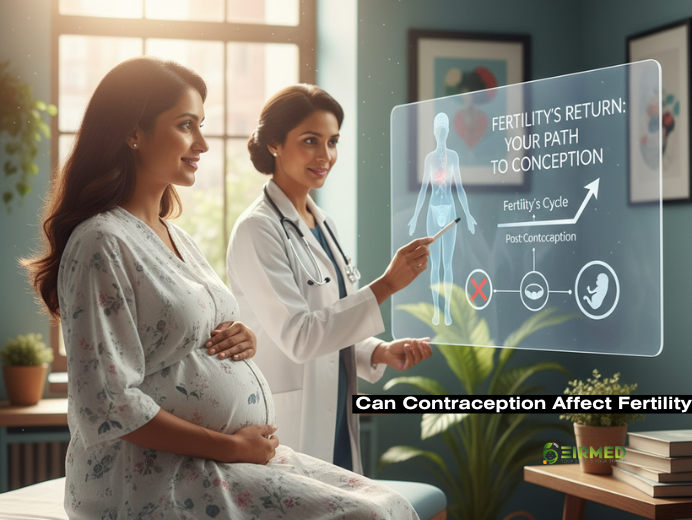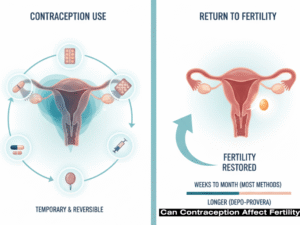Can Contraception Affect Fertility | Strong Evidence Explained in 2025

Can Contraception Affect Fertility? 10 Crucial Facts Every Woman Should Know
 Can contraception affect fertility? This is a concern many women face when considering or stopping birth control, wondering if methods like pills or IUDs might hinder future pregnancies. The truth is, most forms of contraception are reversible and do not cause lasting infertility, allowing fertility to return soon after discontinuation. In this comprehensive guide, we’ll delve into the science behind contraception, its temporary effects on your cycle, common misconceptions, and practical steps to support your reproductive health. Drawing from trusted medical sources, we’ll address how different methods work and what you can expect when planning a family.
Can contraception affect fertility? This is a concern many women face when considering or stopping birth control, wondering if methods like pills or IUDs might hinder future pregnancies. The truth is, most forms of contraception are reversible and do not cause lasting infertility, allowing fertility to return soon after discontinuation. In this comprehensive guide, we’ll delve into the science behind contraception, its temporary effects on your cycle, common misconceptions, and practical steps to support your reproductive health. Drawing from trusted medical sources, we’ll address how different methods work and what you can expect when planning a family.
The Fundamentals: How Does Contraception Work Without Harming Fertility?
Contraception prevents pregnancy by interrupting the reproductive process, but it’s designed to be temporary. Hormonal methods use synthetic estrogen or progestin to suppress ovulation, thicken cervical mucus, or thin the uterine lining, making fertilization difficult. Non-hormonal options, like copper IUDs, create a barrier or alter the environment to block sperm. Importantly, these approaches do not deplete your egg supply or cause permanent changes to ovarian function. Once stopped, your body’s natural hormones resume control, typically restoring fertility within months.
Key Differences Between Hormonal and Non-Hormonal Contraception
Hormonal contraception, including pills and implants, mimics pregnancy hormones to prevent ovulation. Non-hormonal types avoid hormones altogether, offering immediate fertility return upon removal. Understanding these can help you choose a method that aligns with your fertility goals.
Can Contraception Affect Fertility in Specific Ways? Exploring Popular Methods
 Different birth control options have unique profiles, but none lead to long-term infertility. Let’s examine how each might influence your cycle after stopping.
Different birth control options have unique profiles, but none lead to long-term infertility. Let’s examine how each might influence your cycle after stopping.
Oral Contraceptives: The Pill and Its Impact on Future Fertility
Birth control pills regulate cycles effectively, but stopping them allows ovulation to resume quickly, often within weeks. About 80-90% of women conceive within a year, comparable to non-users. Long-term use even shows potential fertility benefits in some studies. If periods were irregular pre-pill, they may return that way, signaling possible underlying issues.
Recovery Timeline After Stopping the Pill
Fertility can return as soon as the next cycle, with half of women pregnant in three months. Full normalization might take 2-6 months for some.
IUDs: Reliable Protection with Minimal Fertility Delays
Intrauterine devices, whether hormonal or copper, offer long-term contraception without compromising future fertility. Hormonal IUDs may suppress ovulation initially, but cycles become regular over time. Older women using IUDs long-term might face slight risks, but overall pregnancy rates are high post-removal. Fertility returns in 71-96% of cases within a year.
Debunking IUD Myths Related to Infertility
IUDs do not cause tubal infertility when properly managed, and risks like infections are low with modern devices. They prevent pregnancy by affecting sperm mobility or implantation.
Injections and Implants: Understanding Potential Temporary Setbacks
 Depo-Provera injections provide three-month protection but can delay fertility recovery up to 18 months. Still, they do not cause permanent infertility. Implants like Nexplanon allow quicker returns, often within a month. Recovery rates reach 82.9% within a year for similar injectables.
Depo-Provera injections provide three-month protection but can delay fertility recovery up to 18 months. Still, they do not cause permanent infertility. Implants like Nexplanon allow quicker returns, often within a month. Recovery rates reach 82.9% within a year for similar injectables.
Factors Influencing Recovery from Injectable Contraception
Median conception delay is around 5.5 months post-last shot, but individual health plays a role.
Other Methods: Patches, Rings, and Barriers
Patches and rings mimic pills, with fertility resuming in 1-3 months. Barrier methods have no delay, as they lack hormones.
Can Contraception Affect Fertility Temporarily? What Happens During the Adjustment Phase
 Yes, short-term disruptions like irregular periods or delayed ovulation are common as hormones stabilize. This phase varies by method, with injectables taking longest. Monitoring cycles helps identify when fertility returns.
Yes, short-term disruptions like irregular periods or delayed ovulation are common as hormones stabilize. This phase varies by method, with injectables taking longest. Monitoring cycles helps identify when fertility returns.
Signs Your Body Is Readjusting After Stopping Contraception
Spotting, missed periods, or acne flares signal hormonal shifts, but these resolve naturally.
Can Contraception Affect Fertility in Specific Cases?
In rare cases, complications from contraception might indirectly affect fertility. For example, an improperly inserted IUD could lead to pelvic inflammatory disease (PID) if an infection occurs, which might impact fertility. However, this is uncommon with proper medical care, as noted by Nashville Fertility. Always consult a healthcare provider to ensure safe use and removal of contraceptives.
Tips to Support Fertility After Stopping Contraception
If you’re ready to conceive, here are some practical steps to optimize your fertility, inspired by advice from CCRM Fertility:
-
Track Your Cycle: Use apps or ovulation kits to understand your fertile window.
-
Maintain a Healthy Lifestyle: Eat a balanced diet, exercise moderately, and avoid smoking or excessive alcohol.
-
Consult a Specialist: If you don’t conceive within 6–12 months (or 6 months if over 35), seek advice from a fertility expert.
-
Stay Patient: It’s normal for conception to take time, even without prior contraception use.
Busting Common Myths: Does Contraception Really Cause Infertility?
 Many myths persist, but evidence shows no long-term harm. Birth control does not lead to weight gain causing infertility or damage fertility permanently. It won’t make future pregnancies harder. Misconceptions often stem from outdated fears.
Many myths persist, but evidence shows no long-term harm. Birth control does not lead to weight gain causing infertility or damage fertility permanently. It won’t make future pregnancies harder. Misconceptions often stem from outdated fears.
Top Myths Debunked with Evidence
Rumors about injections damaging the body are unfounded. Pills do not cause infertility; fertility returns swiftly. Global beliefs in contraception-induced infertility lack scientific backing.
Beyond Prevention: Health Benefits of Contraception for Fertility and Wellness
Contraception reduces risks of ovarian and endometrial cancers. It regulates cycles, eases cramps, and manages PCOS. Pills lower uterine cancer risks and improve acne. These perks enhance overall reproductive health.
How Contraception Supports Long-Term Reproductive Health
It stabilizes periods and prevents unintended pregnancies, benefiting maternal health. Progesterone in pills protects against pre-cancerous changes.
Personal Factors: Can Contraception Affect Fertility Differently for Everyone?
Age, health, and method influence outcomes; over 35s may face natural declines. Conditions like thyroid issues can mimic delays.
Role of Age and Lifestyle in Post-Contraception Fertility
Younger women recover faster; lifestyle choices like diet aid conception.
Preparing for Pregnancy: Boosting Fertility After Contraception
Allow 1-3 months for cycle tracking; focus on nutrition and stress management. EIRMED products support hormone balance.
Natural Tips to Enhance Fertility Post-Birth Control
Incorporate folate-rich foods and exercise moderately.
When to Seek Professional Help: Signs Fertility Might Need Support
If under 35, consult after 12 months; over 35, after 6. No periods after three months warrant a check.
Options for Fertility Assistance After Contraception
Tests and treatments like IVF are available if needed.
Can Contraception Affect Fertility in Special Health Scenarios?
For PCOS, it manages symptoms, aiding future fertility.
Factors That Influence Fertility After Contraception
While contraception itself rarely causes permanent fertility issues, other factors can affect your ability to conceive after stopping birth control. Understanding these can help you prepare for your fertility journey.
Age and Fertility
Age is a significant factor in fertility. Women over 35 may experience a natural decline in fertility, regardless of contraception use. New Hope Fertility emphasizes that egg quality and quantity decrease with age, which can impact conception rates.
Underlying Health Conditions
Conditions like polycystic ovary syndrome (PCOS) or endometriosis can affect fertility. Sometimes, birth control is used to manage symptoms of these conditions, masking underlying issues. After stopping contraception, you may notice irregular cycles, which could prompt further evaluation, according to CNY Fertility.
Lifestyle Factors
Smoking, stress, poor diet, or excessive weight can influence fertility. Maintaining a healthy lifestyle, as recommended by SCRC IVF, supports your reproductive health and can improve your chances of conceiving.
Overall Purpose
This article clarifies if contraception affects fertility by explaining methods, effects, and myths in straightforward terms. It offers facts from medical sources to reduce worries and guide informed choices. You’ll learn recovery tips, benefits, and when to get help, helping you plan confidently. Remember, most women regain fertility quickly, but individual factors matter consult professionals for tailored support. Stay empowered in your reproductive health.
FAQ Section
How soon can fertility return after stopping contraception?
It varies: pills in weeks, injectables up to a year, with 83% pregnant in 12 months.
Does long-term contraception reduce egg quality?
No, age impacts eggs more; contraception may preserve them.
Can contraception help with fertility-related conditions?
Yes, it regulates cycles for issues like endometriosis.
What if periods don’t return after stopping birth control?
See a doctor; it could indicate underlying problems.
Is contraception safe during fertility planning?
It can aid cycle timing in treatments.
Disclaimer
This information is general and not a replacement for medical advice. Consult a healthcare provider for personal concerns about contraception or fertility. EIRMED products aid wellness but do not treat or diagnose conditions. Results vary; discuss with your doctor before use. Content is based on public research and may not apply universally.
Thank You
Thank you for exploring this detailed guide on whether contraception can affect fertility. We hope it provides clarity and reassurance for your health decisions. At EIRMED, we’re committed to supporting your fertility journey with quality products browse our selection or contact us for personalized advice. Your wellness is our priority!

Eirmed is an informational platform dedicated to providing reliable, science-based insights on male and female fertility, reproductive health, and natural conception.

Buy Adderall Online Without Prescription USA
Thank you for your time but is it not possible without prescription in USA Monica Schimmel
Adderall Online Without Doctor Prescription